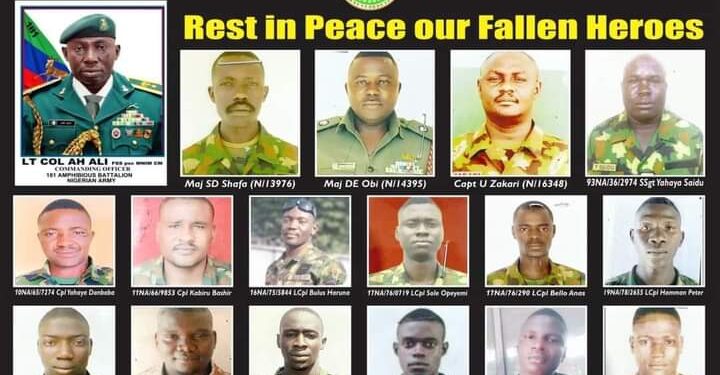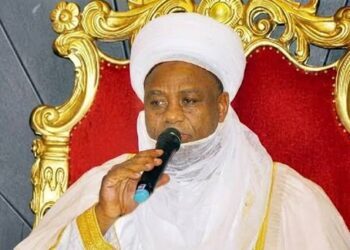BY ABUBAKAR YUSUF
The Oodua Integrity Network has described as a “dirty job” a statement credited to Major General Tajudeen Olarenwaju on the killing of soldiers in okuama linking it to security oil pipelines surveillance.
A statement released on Saturday and jointly signed by the President Chief Adewale Adeosun and the secretary, Ige kilanko avered that for such an unfortunate incidence that elicited shock among the citizens, an incident not witnessed in recent time could be trivialized with such an unguarded statement from a perceived statesman of his calibre.
While wishing the soul of the departed soldiers and officers eternal rest, praying that God will give the family the fortitude to bear the great loss.
For an incident that has generated so much condemnation treated with kid gloves by a man rather than commiseration with his constituency were he had lived the better part of his life.
His position and press release over the okuama killings and position on the engagement of non- state actors in the security of oil installations, displayed his naked ignorance , self serving and unstatemanly.
While displaying his hatchet job and hirelings, his position on the security of oil pipelines surveillance and installation has been overtaken by the global practices and requirements, stating that at no time will the military deployed to man installation at the expense of their primary assignment, hurriedly making reference with other nations.
The self centered and personal emotions along name-calling adopted by the former general was an amazing indicator of his premeditated stance towards resolving the national issues, stating that the name-calling of oil pipelines surveillance handler as thugs, bandits and hoodlums was tantamount to a misconception.
The group expressed utter embarrassment and worries from such a decapitating statement coming from a highly placed individual of high military background and accomplishment, but shrouded in a myopic tendencies.
“It appears the former general was beginning to lost his sense of reasoning fall out of the immediate past administration of President Buhari to engage the private security guard after the military could not guarantee the security of same National asset.”
The engagement of the private security guard had secured the OPEC allotted 2.5M per day down from the paltry 600,000 per day the country was battling with at the peak of oil bunkering when his advice was required.
The statement further said..
OKUAMA KILLING OF 181 BRIGADE SOLDIERS: RTD MAJOR GENERAL TAJUDEEN OLANREWAJU UNSOLICITED MISREPRESENTATION OF PRIVATE SECURITY OIL PIPELINES SURVEILLANCE.
*WHY WOULD A 78-YEAR OLD MAKE HIMSELF AVAILABLE FOR DIRTY JOBS?
“The brutal killing of officers and soldiers of the 181 Brigade, Nigerian Army, Bomadi, Delta State, elicited shock amongst citizens of this nation. An incident of its type hasn’t been witnessed, nor thought of, since the late President Umaru Musa Yar’Adua granted Niger Delta youths Presidential Amnesty over a decade ago. ”
“Therefore, the last week spine- chilling occurrence in Okuama, Delta State, was most abhorrent.
May the Lord grant each of the fallen soldiers eternal peace, and their families the fortitude to bear huge loss.”
“The incident has generated so much discourse across the country.
In the list, is the press statement of 78-year old retired Major General Tajudeen Olanrewaju Rtd, of March 21, 2024. ”
“If it was for commiseration with the Nigerian Army and families of the slain soldiers, it would have been glossed over like others.
After all, the military is his primary constituency. ”
“But the old soldier, in the Press statement purportedly issued by his Media office, titled, “NON-STATE ACTORS PROTECTING OIL INSTALLATIONS POLITICALLY, ECONOMICALLY UNSAFE FOR NIGERIA, dovetailed into areas he has since lost expertise.”
“His knowledge of security matters has long flagged after many years in retirement.
In hurry to discharge the job he was hired to deliver, the retired general said constitutionally recognised military institutions should be positioned and equipped to do the job through specially-trained and strategically built forces like it’s done in India and Venezuela.”
“He poured venoms on the operators of private surveillance security providers hired by the Federal Government to safeguard the nation’s oil and gas equipment, labelling them as militants, thugs and hoodlums, who are not different from bandits.”
“Having read this widely circulated press statement, as a Yoruba group familiar with the genesis of the enlistment of the private security providers for the tasks of safeguarding our national assets, we believed that the ex-General should be enlightened and educated on the matter.”
“Our response also became expedient because as a Yoruba group, we are bothered about the public conduct and utterances of our leaders. Ex-Gen Tajudeen Olanrewaju in pouring the unwarranted venoms displayed arrant ignorance and exhibited unpardonable ignorance unexpected of a Yoruba man, with his level of accomplishment. We are constrained to disagree with him and clear the air over his needless vituperations.”
“Where was the Retired General when former President Muhammadu Buhari GCFR decided to hire private security companies to keep surveillance over Federal Government owned oil assets?
Is it a different military the nation had then, than it has now?”
“What prompted the former President Muhammadu Buhari to look outside the Nigerian Armed Forces to seek help for the protection oil pipelines?
Has the prevailing situation changed?
We do not need knowledge of rocket science to throw light on the matter. ”
“The Armed Forces failed to live up to their duties. Right under their noses crude oil thieves took over the nation’s oil production.
The government lost its major source of foreign exchange earnings. Nigeria could barely produced 600,000 barrels per day, from its over 2.5 million barrels OPEC allotted quota. ”
“The government couldn’t live up to its responsibility to citizens.
It went cap in hand in search of foreign loans.
Where was General Olanrewaju, when Buhari needed advice?
The old general’s tirades against private security firms surveillance of crude oil pipelines, because of the Okuama slaughter of soldiers is unsolicited. It doesn’t resonate. ”
“The killing of officers and soldiers of the 181 Brigade, Bomadi, has no nexus with pipelines surveillance.
General Olanrewaju smelt a rat where there is non.
Does the communal feud between Okuama and Okoloba communities has any connection with crude oil theft, or pipelines surveillance contracts? No!”
“The retired General could not help with advise when President Buhari required it. The General must being on another planet when Buhari was pushed to the wall over oil theft.
Today, through the efforts of the private security companies, crude production has climbed to over 1.7 million barrels per day. ”
“The last report on the economy of the nation showed external foreign reserves of Nigeria has reached $34 Billion.
People other than the military rescued the situation.”
“The press statement of General Olanrewaju had diluted intentions than meet the eyes. The local oil thieves and their international backers whose criminal activities were dealt crippling blows by the private security companies, have latched on the Okuama killings to raise their ugly heads once again.”
“How else would one see it, other than, the old soldier is being hired by criminal oil barons or those failed contractors , in their bid to secure same pipelines contracts to clear the way for them to resume the plunder of the nation’s crude.”
“As a retired general and elder statesman, Tajudeen Olanrewaju’s contribution to national discourse could be weighty. He should not make himself a fly in the ointment of the nation. He should not take the country on tortuous journey back to Egypt. ”
“General Olanrewaju should take a closer look at those prodding him to take a centre stage with his unprofitable advise and suggestions to the government. He should not front for criminals with his well earned reputation, else he becomes an economic saboteur.”
“The non state actors or private security companies he criticized have received commendations for their success in ridding the nation’s waterways of illegal bunkerers, not only from Mr. President, but also from the Nigerian Army and National Assembly. Even the Nigerian Navy has finally accepted them as worthy associates.”
“Has the general not heard of all these?
What he didn’t add to his press release is whether the soldiers were killed by the private security contractors. Communal clashes occur everywhere across the country. There was one bloody one in Osun State recently, was it perpetrated by Pipelines security contractors?”
“This oil thieves are criminals indeed. Otherwise, why would they dust up a Yoruba leader in the person of an outstanding military officer like ex- General Tajudeen Olanrewaju to sacrifice his reputation and muster his contacts to ease out private security operators in an unpatriotic desire to return the country to the dark days when the oil thieves held the country by the jugular. ”
“If the ex-General Olanrewaju must know, newspapers’ reports are awashed with revelations that one of the notorious oil bunkerers that he’s labouring to return to the centre stage of the criminal business is being wanted by the military in connection with the killings of the solders.”
“It’s sad that instead of our revered General Olanrewaju to condemn the killings of the soldiers and join other well-meaning stakeholders to call for the arrest and prosecution of the perpetrators, he wilfully veered of the matters on hands by seizing the opportunity to serve his benefactors – the oil thieves.”
“He should be ignored in totality.
As young Yoruba folks, we are still dazed and amazed over what would compel a 78-year old dabble into this festering issue. Is it a case of hunger and deprivation? ”
“Is he broke to the extent that he couldn’t pay his bills, a tempting situation that made him to be cheaply available to desperate oil buccaneers, who found his reputation attractive readily hired him to clear the way for the resumption of their illicit business of economic sabotage?”
“If it’s a case of senility or hallucination, commonly associated with persons in his age bracket, where are the children, who should be on his surveillance at this critical stage of his life? ”
“It’s uncomplimentary that he would fall to the bait of crumbs from the table of the oil thieves to serve their purposes.
The retired General should recline in his armchair and play with his grandchildren and enjoy his pension.”
“He shouldn’t dabble into issues he can barely comprehend, especially pipelines protection matters that never exist while was in active service.
And if he is still strong on his feet, he should go to the golf course to while away his time with friends.”
“After all, old soldiers never die, they only fade away.
The retired General has long lost his bearings on security matters. “











